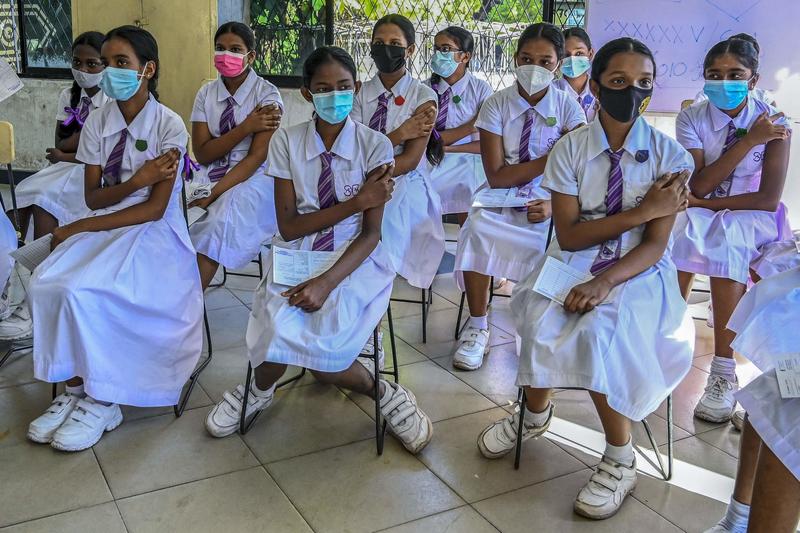 Sri Lankan students wait around after getting vaccinated at a school in Colombo on Friday. The country last week began giving COVID-19 jabs to those aged from 12 to 15. (ISHARA S. KODIKARA / AFP)
Sri Lankan students wait around after getting vaccinated at a school in Colombo on Friday. The country last week began giving COVID-19 jabs to those aged from 12 to 15. (ISHARA S. KODIKARA / AFP)
Sri Lanka is speeding up vaccination for more age groups so as to meet goals of making 2022 the "Visit Sri Lanka Year".
The South Asian island country extended its vaccination drive to include children and teenagers aged 12 to 15 starting Jan 7, wrote Sri Lankan Health Minister Keheliya Rambukwella in a tweet.
Our children and their education should be our priority.
Chandima Jeewandara, director of the Allergy, Immunology and Cell Biology Unit at the University of Sri Jayewardenepura
Those in that age group will be administered Pfizer COVID-19 vaccine, said local health officials.
The move "will help to keep the schools open and avoid disruption to their education", wrote Chandima Jeewandara, director of the Allergy, Immunology and Cell Biology Unit at the University of Sri Jayewardenepura, in a tweet.
"Our children and their education should be our priority," he said.
In a tweet last month, Rambukwella wrote that COVID-19 vaccination cards would be made mandatory to access public spaces in the country from the beginning of this year.
The country's health ministry decided in December to require tourists and locals to have their vaccine cards on hand or show an electronic version of the certificate. In addition, foreign tourists are requested to carry an English translation of their vaccine cards for traveling within the country.
Anwar Hamdani, the COVID-19 coordinator and technical services director at the Ministry of Health, was quoted in the local Daily Mirror newspaper as saying that it had witnessed a gradual drop in the daily count of confirmed cases over the past couple of weeks as well as in the number of related deaths.
He said it is noteworthy that the Omicron transmission had been curtailed to a certain extent due to vaccination. However, an Omicron-fueled wave might emerge "if people fail to receive booster doses on time and comply with health practices".
Economic revival
According to the official data from Epidemiology Unit of the Sri Lankan Ministry of Health, 623 new cases and 15 deaths were reported on Tuesday. The variant's spread is likely to outpace Delta and other variants. A total of 593,072 cases have been reported in the nation since the beginning of the pandemic, with related deaths of 15,134 patients.
A worsening situation is likely to hamper the recovery of Sri Lanka's tourism industry, which is recognized as crucial to rebuilding its economy.
Last month, media reported that Sri Lanka was all set to declare 2022 as the "Visit Sri Lanka Year" in line with its integrated five-year Global Communication Campaign. The move aims to receive 6 million tourists and create $10 billion in revenue by 2025 despite the COVID-19 challenge, as outlined in Sri Lankan President Gotabaya Rajapaksa's policy statement, according to local media.
Despite being hard hit by the pandemic over the past two years, Sri Lanka has been returning to normalcy while recording a rise in tourist arrivals particularly since November. Last year, Sri Lanka logged a total of over 150,000 tourist arrivals.
However, the quick recovery of Sri Lanka's tourism is regarded as being related to the effects of high vaccination rates, with China having played a positive role in helping the country obtain vaccines.
By last week, nearly 70 percent of Sri Lanka's population had been fully vaccinated with China's Sinopharm, the leading vaccine administered.
Munshi Faiz Ahmad, former chairman of the Bangladesh Institute of International and Strategic Studies, described China's efforts in providing vaccines to countries in Africa and the Asia-Pacific as "laudable".


